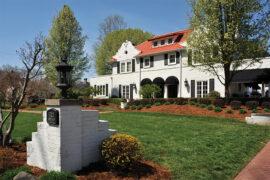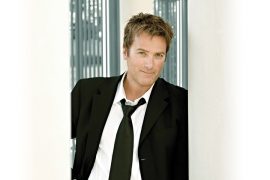Three local war heroes who served their nation with valor
By James E. Casto
HQ 79 | AUTUMN 2012
West Virginians have never hesitated to answer their country’s call to arms. While their homes were still part of Virginia, brave men from the western mountains fought in the French and Indian War, the American Revolution, the War of 1812 and the Mexican War. At least 40,000 men from western Virginia – some in Union blue and others in Confederate gray – fought in the bloody Civil War that gave birth to the new state of West Virginia. Each conflict since has seen West Virginians do their part – and more.
More than 230,000 West Virginians donned their country’s uniform in World War II. From the deadly skies over Nazi Germany to the bloody beaches of Normandy and Iwo Jima, fighting men from the Huntington area served with valor during those danger-filled days. This, the first part of a two-part article, profiles three of WWII’s bravest of the brave – Robert Femoyer, Carwood Lipton and Woody Williams.
Robert Femoyer

During World War II, the Army Air Force trained 10,000 navigators to guide its aircraft on their aerial journeys. Many of those navigators served bravely and received well-deserved military honors. But only two were awarded the Medal of Honor, a grateful nation’s highest military decoration for valor. One of the two was a Huntington native, 23-year-old Robert Femoyer.
Femoyer was a graduate of St. Joseph Catholic High School and an Eagle Scout. He attended Marshall College for one year and Virginia Tech, where a building, Femoyer Hall, is named in his honor. In 2001, the stretch of West Virginia Route 152 from the Fifth Street interchange of Interstate 64 to the Huntington city limits was officially designated Robert Femoyer Boulevard.
Young Femoyer wanted to be a pilot. He joined the Army Reserve and became an aviation cadet in 1943. But he failed pilot school and so was trained as a navigator instead. In September 1944, he was assigned to the European Theater as a 2nd lieutenant in the 447th Bomb Group’s 711th Squadron.
In 1944, Germany’s oil refineries and synthetic fuel plants were among the key targets repeatedly hit by American and British bombers. One such target was at Merseburg, near Leipzig. On November 2, the Eighth Air Force launched a 500-plane bombing raid on Merseburg. The bomber crews at that morning’s briefing left the room knowing all too well that they were heading for a tough, heavily defended destination.
Femoyer was the navigator aboard one of the B-17 bombers assigned to that day’s mission. As the plane neared Merseburg, three anti-aircraft shells slammed into it. The plane was badly damaged, and Femoyer was severely wounded in the side and back by shell fragments. Unable to keep up with the other bombers, the crippled plane was forced to fall out of formation, turn and head back to its base in England, 500 miles away.
His Medal of Honor citation recounts Femoyer’s subsequent heroism:
“In spite of extreme pain and great loss of blood he refused an offered injection of morphine. He was determined to keep his mental faculties clear in order that he might direct his plane out of danger and so save his comrades. Not being able to arise from the floor, he asked to be propped up in order to enable him to see his charts and instruments. He successfully directed the navigation of his lone bomber for 2 1/2 hours so well it avoided enemy flak and returned to the field without further damage. Only when the plane had arrived in the safe area over the English Channel did he feel that he had accomplished his objective; then, and only then, he permitted an injection of a sedative. He died shortly after being removed from the plane. The heroism and self-sacrifice of 2nd Lt. Femoyer are in keeping with the highest traditions of the U.S. Army.”
Carwood Lipton

On June 6, 1944, paratrooper Carwood Lipton parachuted into German-held France – and a place in the history books.
Lipton was a member of the 101st Airborne Division’s Easy Company, 2nd Battalion, 506th Parachute Infantry Regiment, whose real-life exploits became the stuff of legend. Historian Stephen Ambrose interviewed the men and wrote about them in his best-selling book Band of Brothers. The World War II unit gained even more fame when Tom Hanks turned the book into a 10-part miniseries for HBO.
Lipton was born and raised in Huntington. He studied at Marshall College for one year before family financial troubles forced him to quit school and take a plant job. After reading an article in Life magazine about the rigorous training required for paratroopers, he set that as his goal and enlisted in August 1942. He found that paratrooper training was every bit as tough as billed but nevertheless emerged from it successfully.
Lipton was the jump master of one of the lumbering C-47 transports that the paratroopers used to jump into Normandy on D-Day. Once on the ground, he was wounded by shrapnel. A medic patched him up and he returned to the fight. Tasked with destroying four German howitzers that were firing down on Utah Beach, Easy Company took out the four guns. In recognition of his part in the action, Lipton was awarded the Bronze Star.
Again wounded by shrapnel, he was out of action for a few days but soon returned to duty. He was promoted to First Sergeant and then given a battlefield commission as a 2nd lieutenant. He was with Easy Company when it liberated the horrific concentration camp at Landsberg and when it captured the Eagle’s Nest, Hitler’s mountain lodge at Berchtesgaden in Bavaria.
Returning to Huntington after the war, Lipton earned an engineering degree at Marshall. He went to work at the Owen-Illinois plant in Huntington and quickly rose in the bottle company’s ranks. In 1966, the company moved him to New Jersey and in 1971 he was transferred to London where he was the director of manufacturing for eight glass plants in England and Scotland. Three years later, he was moved to Switzerland where he had responsibility for all Owens-Illinois operations in Europe, Africa and the Middle East. He returned to this country in 1982 and retired the following year. Lipton spent his retirement years in Southern Pines, N.C.
Lipton was portrayed by actor Donnie Wahlberg in the HBO miniseries. Lipton was sidelined by surgery during the filming, but Wahlberg telephoned him each night to discuss the next day’s scheduled scenes. On June 6, 2001, Lipton, his three sons and his wife Marie were HBO’s guests at the premiere of the TV production in Paris.
Carwood Lipton died six months later, on Dec. 16, 2001, and is buried in Huntington’s Woodmere Cemetery.
Woody Williams

In February 1945, the American military was determined to capture Iwo Jima. Located just 650 miles from Tokyo, it offered a perfect spot to launch bomber attacks on the Japanese homeland. The Japanese were equally determined to hold on to the island, and so dug an elaborate system of underground tunnels and manmade hillside caves, guarded by machine guns tucked in more than 1,000 reinforced concrete pillboxes.
When the invading U.S. Marines charged ashore from their landing craft, their advance was stalled by withering fire from the Japanese. An officer asked for a volunteer to try taking out several pillboxes that, tucked away on slopes overlooking the beach, had his men pinned down in a deadly crossfire.
“I’ll see what I can do,” responded Cpl. Hershel W. “Woody” Williams, a farm boy from Harrison County, West Virginia.
As the pillboxes kept up their murderous fire, Williams strapped a heavy flamethrower on his back and crawled toward the nearest pillbox. Once he was close enough, he pulled the trigger and a ball of flame raced across the ground and into the gun port of the pillbox, incinerating the Japanese inside. Again and again Williams repeated the process, ignoring the danger involved. Bullets bounced off the tank of jellied gasoline on his back. Any one of them could have exploded the tank, enveloping him in flames.
Williams took out seven pillboxes that day – an incredible feat for a young man who had been rebuffed in his first attempt to join the Marine Corps. “Sorry, but you’re two inches too short,” the recruiter had told him. Later in the war, the height requirement was dropped and Williams rushed to join up.
His heroism that day earned Williams the Medal of Honor. On Oct 5, 1945, he stood stiffly at attention in the White House Rose Garden as President Truman placed the medal around his neck.
After the war, Williams returned to West Virginia, making his home in Ona in rural Cabell County. He was an official with the Veterans Administration in Huntington until his retirement, but he has never retired from being a vocal advocate for the nation’s veterans. Today, he is West Virginia’s only living Medal of Honor holder.
“I’ve thought about Iwo Jima often, but I’ve thought more about those Marines who were killed in that battle and never got to come home,” he says. “To me, they are the true heroes.”





